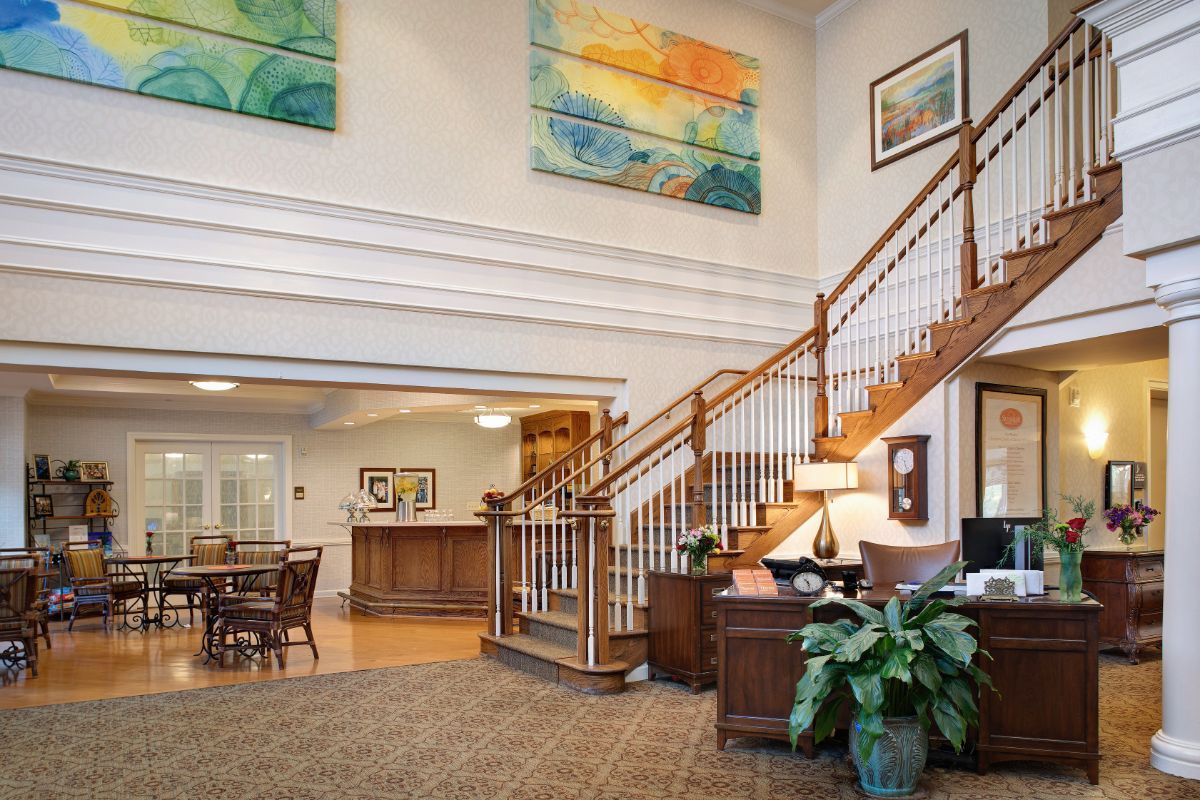Small Memory Carehomes Charlotte: A Heartfelt Alternative
Small Memory Carehomes Charlotte: A Heartfelt Alternative
Blog Article
Everything About Memory Care Providers: Why Tiny Memory Care Residences Are a Fantastic Selection
Memory care solutions play an essential role in sustaining people with Alzheimer's and mental deterioration. Little memory treatment homes attract attention for their individualized approach and intimate setting. With reduced staff-to-resident proportions, these homes foster more powerful links and customized care. Homeowners profit from boosted social communications and a risk-free setting. As households discover alternatives, comprehending the one-of-a-kind benefits of little memory care homes comes to be important. What variables should be thought about when choosing the ideal home?
Comprehending Memory Care Solutions
While many might know with basic senior treatment options, recognizing memory care solutions is important for family members encountering the challenges of cognitive decrease. Memory care particularly provides to people with problems such as Alzheimer's condition and other kinds of dementia. These solutions supply an organized environment that focuses on enhancing the lifestyle for residents with specialized treatment and support.Memory care centers are created to guarantee security and safety, commonly including protected environments to stop wandering. Trained team members are readily available around the clock to help with day-to-day tasks, medication administration, and personal care. Additionally, memory care programs often consist of cognitive excitement tasks, tailored to engage homeowners and advertise mental health. Family members can gain from understanding these services, as they enable notified choices regarding their loved ones' care, ensuring that their specific needs and preferences are dealt with in a encouraging and thoughtful fashion.
The Benefits of Small Memory Treatment Homes
Little memory treatment homes provide distinct advantages that can greatly enhance the quality of life for citizens with cognitive impairments. One substantial advantage is the intimate setting, which enables customized interactions amongst personnel and citizens. This smaller setting promotes meaningful relationships, reducing feelings of isolation and anxiety commonly experienced by individuals with memory issues.Additionally, the lower staff-to-resident ratio in little memory treatment homes enables caretakers to supply more alert guidance and assistance. This technique not only boosts safety but additionally advertises a feeling of safety and security for the residents.Moreover, small memory treatment homes can adapt swiftly to the distinct requirements and choices of each local, permitting a much more homelike ambience. Such an atmosphere can encourage social involvement and participation in activities, ultimately improving the everyday experiences of those dealing with cognitive disabilities.
Personalized Treatment Plans for Citizens
Personalized care strategies are important in memory treatment homes, as they accommodate the special demands and choices of each homeowner. These plans begin with comprehensive assessments performed by skilled specialists, who examine cognitive capacities, case history, and individual passions. This tailored strategy assurances that care is not just effective however additionally respectful of each person's self-respect and autonomy.Moreover, personalized treatment strategies are versatile, permitting adjustments as locals' requirements advance with time. This versatility fosters a sense of protection and experience, which is necessary for people living with memory obstacles. Caregivers are trained to carry out these strategies continually, supplying assistance that straightens with the locals' routines and preferences.Ultimately, personalized treatment strategies enhance the quality of life for citizens by advertising health, self-reliance, and interaction, making them an essential element of memory care services in little memory care homes.
Producing a Home-Like Atmosphere
Creating a home-like environment is crucial for cultivating convenience and experience in memory care settings, as it substantially impacts homeowners' psychological well-being. Tiny memory care homes frequently focus on personalized touches, such as warm shade palettes, household pictures, and familiar furniture setups, which assist homeowners really feel more at convenience. Incorporating components reminiscent of a traditional home, like relaxing space and common locations, encourages a sense of belonging.Moreover, making use of natural light and outside spaces can enhance the ambience, promoting leisure and serenity. Personnel play a significant function in keeping this environment by engaging with citizens in a caring manner, treating them like family. Regular activities, such as food preparation or horticulture, can also add to a home-like feel, offering opportunities for locals to join purposeful experiences. In general, developing a nurturing atmosphere supports cognitive function and emotional security, making it a vital facet of memory care services.
Enhanced Social Interaction and Area
Boosted social communication and area are important parts of memory treatment services. By promoting personalized social engagement and creating a family-like environment, these services promote purposeful connections amongst residents. Team activities and occasions further encourage involvement, assisting individuals feel a lot more included and sustained.
Individualized Social Involvement
While social communication is essential for general well-being, many individuals with memory problems typically struggle to involve meaningfully with others. Customized social interaction in memory treatment homes addresses this obstacle by creating customized activities that satisfy homeowners' unique passions and capacities. By focusing on individual choices, caregivers can foster links that reverberate deeply with everyone. Tasks such as art therapy, music sessions, and led conversations promote cognitive stimulation and psychological expression. Furthermore, small team setups encourage sociability and permit for more intimate interactions, improving feelings of belonging. This strategy not only fights feelings of seclusion yet also equips citizens to preserve a sense of identification, eventually adding to enhanced mental health and quality of life.
Family-like Atmosphere
In a memory care setup, cultivating a family-like ambience significantly boosts social interaction and constructs a sense of neighborhood among residents. Smaller sized memory treatment homes commonly prioritize intimate settings, allowing homeowners to create closer links with each other and staff participants. This nurturing atmosphere advertises count on, which is crucial for individuals with memory disabilities. internet Citizens are a lot more most likely to involve in discussions and share experiences, developing a supportive network that eases sensations of loneliness. The experience of common rooms and routines contributes to a feeling of belonging, even more encouraging social interaction (personalized memory care). In such settings, psychological bonds grow, resulting in boosted overall health and a better of life for citizens as they navigate their day-to-day experiences with each other
Team Activities and Events

Safety and Safety Functions in Little Houses
Numerous little homes developed for memory care include crucial security and safety and security features to ensure the well-being of homeowners. These homes typically utilize secure entrance and exit points to protect against wandering, an usual worry among individuals with memory problems. In addition, monitoring systems and alarm mechanisms boost surveillance, making sure that personnel can quickly react to any kind of uncommon activities.Interior layouts are customized for safety and security, with lessened risks such as sharp corners and clutter-free pathways. Handrails and non-slip floor covering are typically mounted to reduce the threat of falls. Personnel are learnt emergency situation protocols, guaranteeing they are planned for numerous situations.Moreover, individualized care plans might consist of evaluation of specific safety requirements, offering tailored services for each and every local. In general, these security and protection functions create a caring environment where residents can grow while maintaining their dignity and freedom.
Just how to Choose the Right Memory Care Home
Just how can family members guarantee they select the most appropriate memory treatment home for their enjoyed ones? The decision requires cautious consideration of a number of variables. Households must evaluate the facility's team certifications and training, ensuring that caretakers are experienced in managing memory-related conditions. Next off, it's essential to assess the home's atmosphere, concentrating on security features and whether it try this web-site cultivates a sense of community and belonging. Visiting the center can supply understanding into daily tasks and the social ambience, which are essential for psychological stimulation and emotional wellness. Furthermore, families need to inquire concerning the treatment plans offered, guaranteeing they are customized to private needs. Finally, considering the home's area and access for family members sees can add to a smoother change. By dealing with these facets, households can make an educated decision that prioritizes their enjoyed one's convenience and lifestyle in a memory treatment setting.
Regularly Asked Concerns
What Certifications Should Staff Members in Memory Treatment Houses Have?
Personnel in memory care homes ought to possess appropriate accreditations, experience in dementia care, solid communication abilities, and compassion. Ongoing training in behavioral monitoring and healing treatments improves their capability to sustain homeowners successfully.
Exactly How Do Memory Care Provider Differ From Traditional Assisted Living?
Memory care solutions focus particularly on people with memory disabilities, supplying specialized support and organized settings. In contrast, standard assisted living offers basic assistance with everyday tasks, lacking the tailored technique essential for those with cognitive difficulties.
What Sorts of Activities Are Supplied in Memory Care Homes?
Memory treatment homes usually use a variety of tasks designed to engage citizens. Common options consist of art treatment, music sessions, cognitive video games, exercises, gardening, and get-togethers, all focused on boosting wellness and cognitive function.
Can Citizens Bring Their Own Personal Belongings to Memory Treatment Residences?
Residents can usually bring their very own personal belongings to memory treatment homes, permitting them to personalize their living space - personalized memory care. This practice helps create a familiar atmosphere, advertising comfort and a feeling of identification for the people

How Are Family Participants Entailed in the Treatment Refine?
Household participants play an important duty in the treatment process, typically joining decision-making, attending treatment conferences, and giving emotional support. Their participation cultivates a collaborative setting, boosting the homeowner's general well-being and lifestyle. While lots of may be acquainted more with general senior treatment alternatives, understanding memory care services is necessary for family members encountering the obstacles of cognitive decrease. These solutions supply an organized atmosphere that concentrates on boosting the high quality of life for homeowners with specialized care and support.Memory treatment facilities are developed to ensure security and safety and security, frequently including protected atmospheres to avoid wandering. Personalized care plans are important in memory care homes, as they provide to the one-of-a-kind requirements and choices of each resident. Staff participants in memory care homes should possess appropriate accreditations, experience in dementia treatment, strong communication abilities, and empathy. Memory care solutions focus particularly on people with memory problems, supplying specific support and organized settings.
Report this page